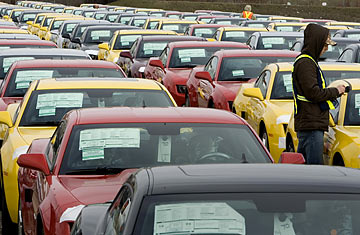
General Motors workers prepare the new Chevrolet Camaro for delivery at the Oshawa Ontario facility on April 8, 2009
1. How bad are sales, really?
After edging up in May, sales dropped again in June below the 10 million–unit annual sales pace, which puts new vehicle sales at the slowest pace since the recession in 1958 — a downturn that forced some carmakers, notably Packard, to shut their doors for good. Meanwhile, each of the Big Six (the three domestic carmakers plus Toyota, Honda and Nissan, which together account for 75% of all vehicle sales in the U.S.) reported double-digit declines in sales. The declines ranged from 11% at Ford to nearly 42% at Chrysler. German automakers such as Volkswagen, BMW, Porsche and Mercedes-Benz also reported double-digit declines.
2. By how much will the new federal "Cash for Clunkers" program help stimulate sales?
Carmakers are hoping the program will add about 250,000 units to the industry's sales total in the next few months. However, the program, which offers rebates of $3,500 to $4,500 for consumers trading in older vehicles for new, more-efficient vehicles, won't get rolling until July 24, and its $1 billion in funding expires Sept. 30. Automakers are already lobbying for more cash. Germany sank $6 billion into a similar scrappage program, China put $4 billion into its equivalent of cash for clunkers, and Brazil put up $3 billion, notes Mark LaNeve, GM's vice president of sales, service and marketing.
3. How long can Detroit sustain itself when monthly sales numbers are this bad?
The two bankrupt companies, Chrysler and General Motors, closed their assembly lines for much of May and June, which reduces their revenue substantially. Chrysler started up this week but will close again next week for summer changeovers. Both GM and Chrysler have built their recovery plans on very low sales estimates, which is the principal reason they have closed so many factories and discarded so many employees as they restructure. GM just announced plans to shed another 4,000 salaried employees by October, at which point it expects to have trimmed $12 billion in costs. GM also cut its advertising spending in half this year, which doesn't exactly stimulate sales. Bottom line: the next 12 to 18 months are perilous for both companies — and they'll need a modest improvement in sales just to survive. Ford, meanwhile, has played a difficult hand quite deftly. Despite a drop in sales volume, it has outperformed the market during the second quarter, reclaiming second place in total sales from Toyota and closing in on GM.
4. Are rental-fleet sales down for good?
Jim Farley, Ford group executive for sales and marketing, says rental fleets are starting to look for replacements for worn-out vehicles. Rental fleets have kept cars in service longer than in the past, but they're going to have to pay more for replacements now because automakers have slashed assembly capacity. One of the reasons Chrysler sales have dropped so dramatically this year is that the company withdrew from the fleet business because it was unprofitable.
5. Is Detroit's strategy of focusing on its profitable lines working?
Neither GM nor Chrysler is profitable yet. Going forward, however, both companies' recovery plans call for concentrating on vehicles that promise an adequate return. They will continue to focus on their profitable lines, such as Chrysler's minivans and GM's pickup trucks. But both GM and Chrysler will be adding new, small cars to their lines by 2011, as they say they will make a profit on those vehicles with rising gasoline prices.
6. Toyota is taking it on the chin along with everyone else. What does this mean for the oh-so-hip maker of the Prius?
Sales of the new 2010 Prius got off to a strong start in June, according to Toyota, as consumers bought more than 13,000 units. But it's the sales of Toyota's other vehicles, such as its full-size pickup truck, the Tundra, and its hip little Scion that have borne the brunt of Toyota's sales slump. The company hopes to stem the decline by beefing up sales of its small utility vehicle, the RAV4, its Sienna minivan and the Camry sedan. Toyota executives have also raised incentives and are trusting that rising gas prices will help arrest the sales decline. Toyota traditionally does well as gasoline prices increase because of its reputation for fuel efficiency.
